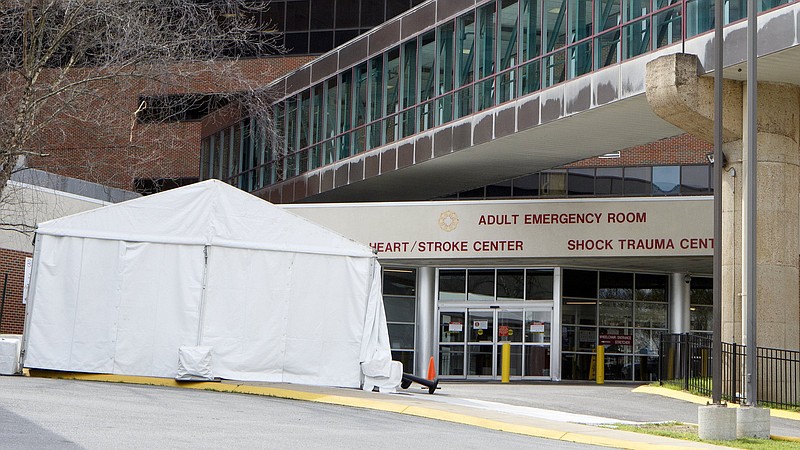Erlanger Health System officials estimate that the public hospital saw a $35 million reduction in net patient revenue for the month of April due to temporarily suspending elective procedures, decreases in admissions and other coronavirus-related expenses.
The loss is offset somewhat by stimulus funds and cost-reduction measures, including furloughing staff early in the outbreak. However, hospital payments from the CARES Act - the federal coronavirus relief fund - thus far have favored other hospitals over ones such as Erlanger, which treat higher volumes of Medicaid and uninsured patients.
"We have received multiple deposits of stimulus funds. They are not remotely close to the point of overcoming the financial losses our organization has experienced due to COVID-19," Dr. Will Jackson, president and CEO of Erlanger Health System, said during an Erlanger Board of Trustees meeting on Thursday.
Jackson said that Britt Tabor, Erlanger's chief financial officer, has "relentlessly pursued" all available funds to help the health system weather the crisis.
So far, the federal government has distributed three rounds of hospital payments for a total of $72 billion to hospitals across the United States. Erlanger has received just over $28 million across its seven hospitals and community health centers.
The first round of payments favored hospitals with higher numbers of patients with commercial health insurance and Medicare, while the second round of payments was based on net revenue. The third round of payments was sent to hospitals that were highly impacted by the coronavirus and to rural providers.
While Erlanger's health centers and rural hospitals did receive some money from the third round, the hospital's COVID-19 admissions had to be 100 or more to qualify as "hard hit" by the coronavirus. A total of 395 hospitals in the United States received those funds, and only two Tennessee health systems qualified.
Takeaways from Erlanger CFO Britt Tabor's report:
April Volumes - Admissions: 35.6% less than prior year - Inpatient surgeries: 42.1% less than prior year - Outpatient surgeries: 70.4% less than prior year - Physician visits: 26.2% less than prior year (telemedicine visits offset some decline) - ER visits: 44.5% less than prior year Liquidity - Implemented cost containment in late March - Secured $64 million line of credit - Medicare Advanced Payments: $93.1 million would have to be paid back within one year - Current days cash on hand: 107 based on historical expense per day Stimulus funds - First round: received $13.9 million based on approximately 6% traditional Medicare payments; Erlanger Western Carolina hospital received $943,000 - Second round: received $5.9 million based on net revenues - Third round: received $0 since COVID-19 admissions were less than 100 – A total of 395 hospitals in the United States received funds. Tennessee had two Systems that qualified. - Third round: rural providers (critical access hospitals and FQHCs), received $3.4 million for Erlanger Bledsoe and FQHCs; Erlanger Wester Carolina Hospital Received $4.4 million Grants - Grants awarded: $1.7 million - Grants outstanding: FEMA, FCC/Telemedicine, HRSA, State, Financial Impact
Tabor said the fourth and final round of payments is supposed to target safety net hospitals such as Erlanger, but the government hasn't said when or how much will be coming, leaving hospital leaders in the dark as to how to plan for the future.
"A good example would be children's hospitals. They have high Medicaid [volumes], and through all this they've received very little money, but yet the volumes have been impacted just like any other hospital," Tabor said during his report to the board. Erlanger operates the region's only children's hospital.
Tabor said that federal stimulus funds were just one source of money, but that securing a $50 million line of credit as well as advanced payments from the U.S. Centers for Medicare and Medicaid Services, were other fallback options - although unlike the stimulus funds, those funds would have to be paid back.
At this point, Tabor said that Erlanger does not plan to draw on the line of credit or Medicare advanced payments this fiscal year, which ends June 30.
Contact Elizabeth Fite at efite@timesfreepress.com.
